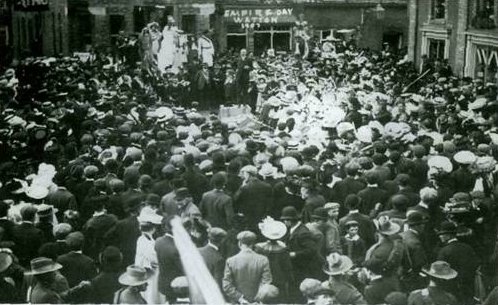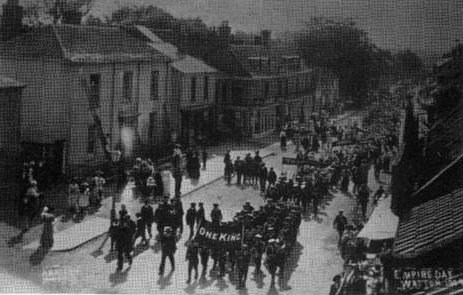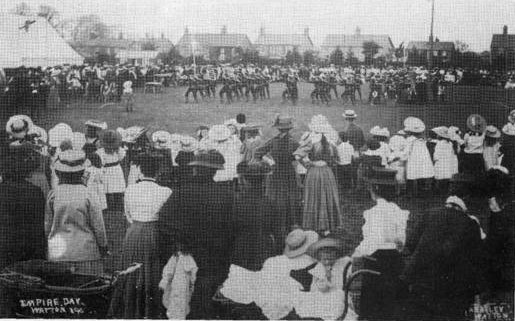
Empire DayA penny would buy so much then, with a choice of bull's eyes, coconut crisps, gob-stoppers, hum bugs, jelly babies and sherbert, to mention just a few of her popular lines. Sharman's was the most popular butchers shop with the boys because the genial grandfather of the present manager kindly gave us the occasional pigs bladder which could be inflated to make an excellent substitute for a football. Wednesday was the day many boys looked forward to most and as soon as school was over they dashed up to Hall and Palmer's and Barnham's Sale Yards to earn a few coppers helping farmers to drive home their purchases of cattle or sheep. On one occasion another boy and myself drove half a dozen frisky young bullocks to a farm two miles away. Having finally delivered them safely, after a few exiting escapades over some gardens, the farmer was full of praise for our efforts, thus giving us hopes of a fair reward. He then said. "Do you boys keep rabbits"? As almost every boy of my generation did, it was no surprise to him when we said "Yes". Pointing to a heap of swedes as large as footballs, he said, "You can have as many of them as you can carry home". We both took one under each arm, but after a quarter mile we had to leave them on the verge as our arms ached so much. When shopping at Kendall's one day, the customer in front of me did not appear to be very bright, but informed the new assistant that she would like a score of eggs, but only if she could have all "Black Hens Eggs", in those days they were sold by the score and were not graded. A large basketful was standing on the counter with a ticket saying, "Fresh eggs 1s. 2d. a score". Looking puzzled, the assistant remarked that he could not tell a black hen's egg from another, but told her that if she could, she could help herself. After she had gone the assistant asked me if I could tell a black hen's egg. I replied that after watching her, I could, as she had chosen the 20 largest eggs in the basket. This taught me that a person could well be brighter than appearance suggested. Mr Knight, our schoolmaster, was a great musician and the conductor of the local Choral Society. He had no interest in any sport and we were never allowed to play football during school hours. Once a week during the summer, if no one had misbehaved, we were taken to the "playpiece" the last hour on Fridays, for cricket. It was then that the boys of my age got to know Charles Lintott, the previous head master, who was a great cricketer. Here he gave us both instruction and encouragement in the noble arts of the game. Offering 3d to any boy who hit a boundary, or took a wicket and if we could hit two sixes, or take two wickets in one over, we were rewarded with 6d, a lot of money in those hard times. Stepping off the mid-day train on Tuesdays was the dapper figure of Mr Challis carrying two large, flat, baskets and crying his wares, "Fresh cream cheeses". Another familiar character was Bob Cockrell, who with his pony and cart hawked the town crying, "Live cockles, live cockles, green samphire, and green samphire". Another character who was always good for a laugh was Albert Eyre, a watchmaker whose shop was next to Clarence House. Whenever he saw a few boys approaching he would roll about as if drunk. Thrusting a hand deep into — what must have been a specially made pocket — he would produce the largest pocket watch I ever saw, about 8 in across and 1 in thick. He would then say, "Can one of you boys tell me the time as I can't see the figures on this little old watch". With only a few horse drawn vehicles and one or two cars, the children had the freedom of the streets and on their way to school the boys indulged in such pursuits as hoop running, top spinning, marbles and pop guns while the girls favoured hop-scotch and skipping ropes. Next to "Show Day", the most exciting day of the year for school children of my generation was Empire Day, May 24th, set aside for the celebration of the anniversary of Queen Victoria's Birthday. On this day all school children from Watton and the surrounding villages marched through the street, headed by a band, to the meadow that is now the site of Charles Avenue, where sports were held, dancing round the Maypole and a most scrumptious tea provided. In the procession the two leaders of each school carried a Union Jack, or a banner with such words as, "One King, one Empire", or "For King and Coun try", emblazed across it. Sunday School outings were also much looked forward too and the earliest ones I remember going to were Mr Howe's Church Farm at Threxton and Mr Saunders's Broadmoor Farm at Carbrooke. Later we were taken to the seaside in a solid-tyred "Char-a-bang" and on one occasion when going to Sheringham some of us had to help the "old lady" up the hill a mile or two from Holt. To the older residents of Watton any mention of Loch Neaton would remind them of one of its former caretakers and a true Norfolk character. For many years Sam Rose carried out his duties in a faithful manner and boys at this time who bought a season ticket to use the pleasure grounds regard ed Sam as a kind inspector whose chief delight was to uphold rigidly all the regulations printed on the admission card. Usually Sam was generous in the half hour allowed for hiring a boat, but crafty boys would keep the boat well away from the mooring posts as the 30 minutes was about up. Then Sam would shout out in his rich Norfolk voice, "Come yew on in bor with that theer bote". Strangely, the young oarsmen would suddenly become remarkably hard of hearing. An up-to-date swimming pool such as is now being constructed was beyond Sam's wildest dreams. During the winter he and an assistant would go out in an old punt and cut the weeds with a scythe so that the people could swim in the natural lake the following summer. In his early days Sam was one of the horse-drawn mail cart drivers between Shipdham and Thet ford. Calling at Watton Post Office for the mail before continuing along the lonely 12 mile drive across the heath via Smoker's Hole and Frog's Hill, to Thetford. He was also the last landlord of the "Live and Let Live" Inn where his son "Wink" kept a horse and cart. One evening we were having tea on the day of a District Council Election when a hard knock on the door caused my father to answer it in haste. The next thing I heard was, "Hev'ya bin to wote yit guv'ner, dew I'll teark yew an tha missus in me ole hoss an cart, but don't yew forgit to wote fur tha missus, will yew". Opposite the old "Live and Let Live", where Mrs Friend now lives, John Partridge had a smoking house for curing hams. In my schooldays most people in the villages surrounding Watton kept a couple of pigs. One they would have killed for the family's use and the other was sold to pay the rent and other com mitments. The hind legs of the pigs were taken to John for converting into mouth-watering hams and the front legs were usually made into pork cheeses.
|



